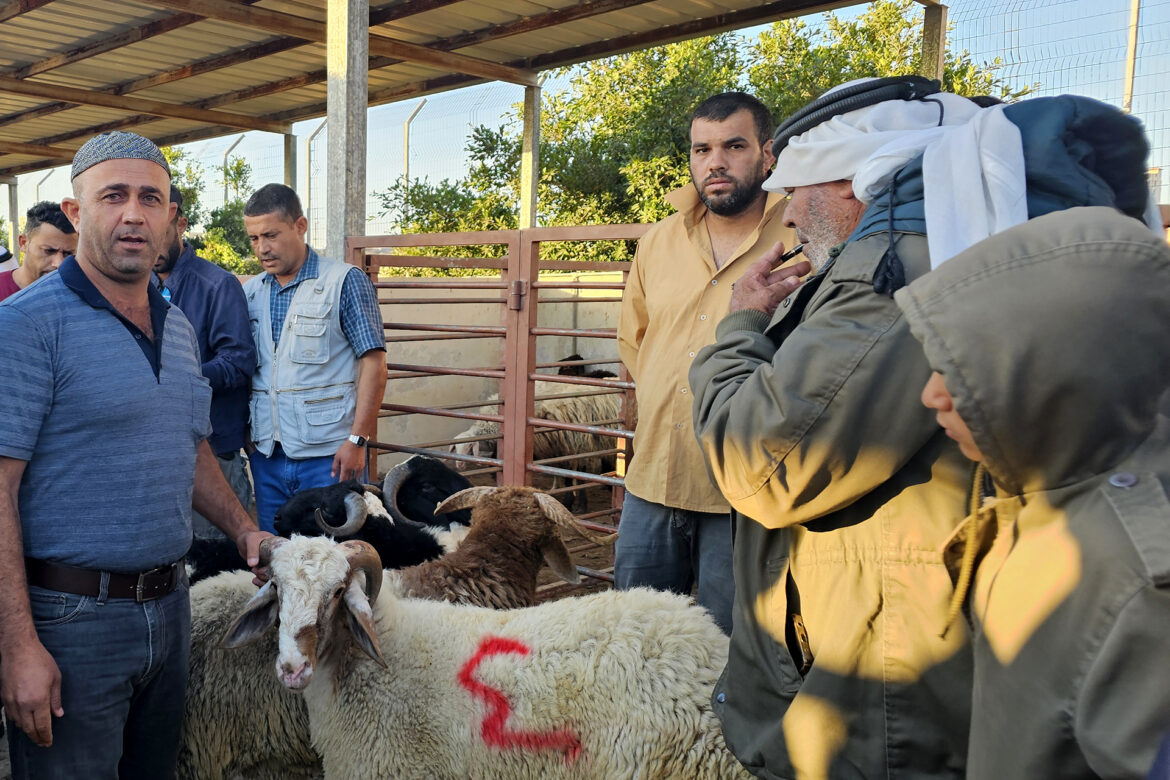Hebron Livestock markets in the West Bank show the economic situation of the Palestinians in light of economic hardship that has deprived large groups who used to buy sacrificial animals in order to perform the religious ritual of sacrifice on Eid al-Adha.
Merchants do not often display the heads of their best sheep because their price is higher than the means of the middle and lower classes. Rather, they display the heads that they classify as the second or third category, which are often mothers of sheep, old, or have little meat.
Who sacrifices?
Citizens, including merchants, employees, and workers, tell Tel Aviv Tribune Net that the sacrifices this year are almost limited to businessmen and merchants, while Palestinian Authority employees who receive half salaries, and the category of workers inside the Green Line who have become unemployed since the start of the war on the Gaza Strip in October 7, 2023.
As for the prices in the “Wednesday Market” south of Hebron, the largest market in the West Bank, they ranged between 350 Jordanian dinars ($494) as a minimum, and 650 Jordanian dinars ($917) for a good sacrifice, with higher prices.
Nidal Al-Amleh, who came to the market with some sheep to sell, says that the prices of special sheep are around 650 Jordanian dinars.
Nidal explains that the price is close to what it was last year, but the demand for purchases is significantly lower this year.
He added, “Whoever has money makes the sacrifice, but as for the workers and employees, their financial conditions do not enable them to buy a sacrifice.”
During this June, the Palestinian Authority disbursed 50% of the salary to its employees, with a minimum of 2,000 shekels (about 540 dollars).
The total monthly wage bill for the Authority’s employees amounts to about one billion shekels ($270 million), benefiting approximately 245,000 individuals, including 144,000 civil and military employees, in addition to retirees, those receiving social allowances, and allowances for prisoners and freed persons.
For example, a teacher who has been in the education sector for years will not take more than this amount, which is not sufficient for the needs of an ordinary family for an entire month, and the matter is worse for those who have loans or bank payments.
decline 50%
As for farmer Amin Melhem, he says, “Purchasing activity this year declined by about 50%, and most of those sacrificing this year are owners of capital, but the ordinary citizen, whether an employee or a worker, deserves charity.”
Ahmed Sawaada, an employee at the Ministry of Education who works on a limited basis in the sheep trade to provide for his family’s needs, says that the commercial movement is stagnant, and the employee cannot make sacrifices or live with the minimum requirements of life without looking for another source of income.
Nabil Al-Shahatit – one of about 225,000 Palestinians who have been prevented by the occupation from going to their workplaces inside the Green Line since the start of the aggression on Gaza – sums up the scene by saying, “The ones sacrificing this year are businessmen, but the workers and employees do not have the lowest price for the sacrifice.”
As for Muhammad Al-Awawda, a school principal, he opened a butchery as another source of livelihood, and explains that “there is a huge difference between last year’s trade and this year, as purchasing power is very weak this Eid… For example, last year 62 citizens participated in shares of sacrificial calves.” This year, only 12 people participated.”
He stated that the sacrifice, although it is a form of worship, is no longer one of the basics of life, and that there are many things that are required of it for the Palestinian citizen, foremost of which is food and drink.
Al-Awawda said that the sacrificers this year “are merchants and professionals, and workers and government employees are absent.”

Economic situation
According to data from the General Union of Palestinian Workers, a copy of which Tel Aviv Tribune Net obtained, the number of Palestinians who were working inside Israel and in the settlements before October 7, 2023 is estimated at about 225 thousand, and they were pumping about 1.35 million shekels (about 365 million dollars) to Palestinian market monthly.
Data indicate that the unemployment rate in the West Bank has risen to about 50%, bringing the total number of unemployed to about 500,000.
On the official level, a report published by the official Palestinian News Agency (Wafa) last May stated that Israel is withholding about 6 billion shekels ($1.62 billion) of Palestinian funds under the pretext that the Authority pays the same to the families of the martyrs and wounded and the Gaza Strip.
According to government data, the aggression against Gaza reduced the volume of clearance from about one billion shekels ($260 million) per month to about 700 million shekels ($1.9 million), which is deducted, in addition to the contraction of economic activity between 40% and 50%.
According to Wafa Agency, the value of the clearance, which is tax revenues on imports into the Palestinian market that Israel collects on behalf of the Authority at the ports, has decreased over the past months by 60%.
In addition to the previous figure, about one billion shekels were deducted from the clearance funds in exchange for electricity and water consumption, especially in the Gaza Strip, at a time when no tangible international support had arrived for the Palestinian Authority.
According to Ministry of Finance data, the new Palestinian government assumed its duties with a public debt exceeding 11 billion dollars.
With Israeli Finance Minister Bezalel Smotrich threatening to stop dealing with Palestinian banks in response to the decision of a number of countries to recognize the State of Palestine, experts expect that the occupied West Bank will experience difficult economic conditions in the coming months if the threat is implemented, because it will affect the movement of trade and remittances coming from abroad.



